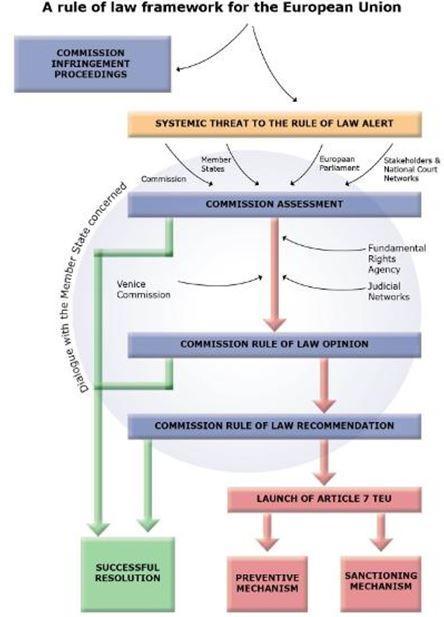The Polish authorities have one month to reply to the Letter of Formal Notice.
The Commission’s key legal concern identified in the law on the organisation of ordinary courts relates to the discrimination on the basis of gender due to the introduction of a different retirement age for female judges (60 years) and male judges (65 years). This is contrary to Article 157 Treaty on the Functioning of the European Union (TFEU) and Directive 2006/54 on gender equality in employment. In the Letter of Formal Notice, the Commission also raises concerns that by giving the Minister of Justice the discretionary power to prolong the mandate of judges who have reached retirement age, as well as to dismiss and appoint Court Presidents, the independence of Polish courts will be undermined (see Article 19(1) of the Treaty on European Union (TEU) in combination with Article 47 of the EU Charter of Fundamental Rights). The new rules allow the Minister of Justice to exert influence on individual ordinary judges though, in particular, the vague criteria for the prolongation of their mandates thereby undermining the principle of irremovability of judges. While decreasing the retirement age, the law allows judges to have their mandate extended by the Minister of Justice for up to ten years for female judges and five years for male judges. Also, there is no time-frame for the Minister of Justice to make a decision on the extension of the mandate, allowing him to retain influence over the judges concerned for the remaining time of their judicial mandate.
In addition, First Vice-President Frans Timmermans sent a letter yesterday to the Polish Minister of Foreign Affairs reiterating the invitation to him and the Polish Minister of Justice for a meeting in Brussels at their earliest convenience in order to relaunch the dialogue. As he said in the context of the Rule of Law dialogue: “The Commission’s hand is still extended to the Polish authorities, in the hope of a constructive dialogue.”
Next steps
The Commission’s Letter of Formal Notice requests the Polish Government to reply within one month. After examining Poland’s reply, or if no observations have been submitted within the prescribed time-limit, the Commission may issue a Reasoned Opinion, the second stage of the infringement procedure.
Background
The College of Commissioners decided on Wednesday 26 July to launch this infringement procedure as soon as the Law on the Ordinary Courts Composition was published. The publication took place on 28 July.
The infringement comes in addition to the ongoing Rule of Law Dialogue launched by the Commission in January 2016 and the complementary Rule of Law Recommendation issued on 26 July. The rule of law is one of the common values upon which the European Union is founded. It is enshrined in Article 2 of the Treaty on European Union. The European Commission, together with the European Parliament and the Council, is responsible under the Treaties for guaranteeing the respect of the rule of law as a fundamental value of our Union and making sure that EU law, values and principles are respected. Events in Poland led the European Commission to open a dialogue with the Polish Government in January 2016 under the Rule of Law Framework. The Framework – introduced by the Commission on 11 March 2014 – has three stages (see graphic in Annex 1). The entire process is based on a continuous dialogue between the Commission and the Member State concerned. The Commission keeps the European Parliament and Council regularly and closely informed.
Annex I – Rule of Law Framework

Annex II – Article 7 Treaty on European Union
1. On a reasoned proposal by one third of the Member States, by the European Parliament or by the European Commission, the Council, acting by a majority of four fifths of its members after obtaining the consent of the European Parliament, may determine that there is a clear risk of a serious breach by a Member State of the values referred to in Article 2. Before making such a determination, the Council shall hear the Member State in question and may address recommendations to it, acting in accordance with the same procedure.
The Council shall regularly verify that the grounds on which such a determination was made continue to apply.
2. The European Council, acting by unanimity on a proposal by one third of the Member States or by the Commission and after obtaining the consent of the European Parliament, may determine the existence of a serious and persistent breach by a Member State of the values referred to in Article 2, after inviting the Member State in question to submit its observations.
3. Where a determination under paragraph 2 has been made, the Council, acting by a qualified majority, may decide to suspend certain of the rights deriving from the application of the Treaties to the Member State in question, including the voting rights of the representative of the government of that Member State in the Council. In doing so, the Council shall take into account the possible consequences of such a suspension on the rights and obligations of natural and legal persons.
The obligations of the Member State in question under the Treaties shall in any case continue to be binding on that State.
4. The Council, acting by a qualified majority, may decide subsequently to vary or revoke measures taken under paragraph 3 in response to changes in the situation which led to their being imposed.
5. The voting arrangements applying to the European Parliament, the European Council and the Council for the purposes of this Article are laid down in Article 354 of the Treaty on the Functioning of the European Union.
Follow this news feed: EU





